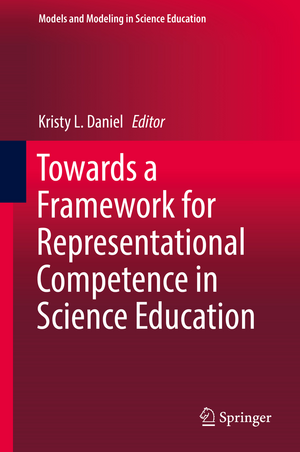Towards a Framework for Representational Competence in Science Education: Models and Modeling in Science Education, cartea 11
Editat de Kristy L. Danielen Limba Engleză Hardback – 6 iul 2018
| Toate formatele și edițiile | Preț | Express |
|---|---|---|
| Paperback (1) | 559.44 lei 38-44 zile | |
| Springer International Publishing – 19 ian 2019 | 559.44 lei 38-44 zile | |
| Hardback (1) | 894.46 lei 3-5 săpt. | |
| Springer International Publishing – 6 iul 2018 | 894.46 lei 3-5 săpt. |
Preț: 894.46 lei
Preț vechi: 1090.81 lei
-18% Nou
Puncte Express: 1342
Preț estimativ în valută:
171.15€ • 178.71$ • 141.33£
171.15€ • 178.71$ • 141.33£
Carte disponibilă
Livrare economică 25 martie-08 aprilie
Preluare comenzi: 021 569.72.76
Specificații
ISBN-13: 9783319899435
ISBN-10: 3319899430
Pagini: 305
Ilustrații: VI, 277 p. 88 illus.
Dimensiuni: 155 x 235 mm
Greutate: 0.54 kg
Ediția:1st ed. 2018
Editura: Springer International Publishing
Colecția Springer
Seria Models and Modeling in Science Education
Locul publicării:Cham, Switzerland
ISBN-10: 3319899430
Pagini: 305
Ilustrații: VI, 277 p. 88 illus.
Dimensiuni: 155 x 235 mm
Greutate: 0.54 kg
Ediția:1st ed. 2018
Editura: Springer International Publishing
Colecția Springer
Seria Models and Modeling in Science Education
Locul publicării:Cham, Switzerland
Cuprins
Section A: The Importance of Representational Competence.- 1. Towards a Definition of Representational Competence, Kristy L. Daniel, Carrie Jo Bucklin, E. Austin Leone, and Jenn Idema.- 2. Representational Fluency: A Means for Students to Develop STEM Literacy, Tamara J. Moore , S. Selcen Guzey, Gillian H. Roehrig, and Richard A. Lesh.- 3. Similar Information – Different Representations: Designing a Learning Environment for Promoting Transformational Competence, Billie Eilam and Shlomit Ofer.- 4. Agreeing to disagree: Students negotiating visual Ambiguity through scientific argumentation, Camillia Matuk.- 5. A Learning Performance Perspective on Representational Competence in Elementary Science Education, Laura Zangori.- Section B: Teaching Towards Representational Competence.- 6. Supporting Representational Competences Through Adaptive Educational Technologies, Martina A. Rau.- 7. Instructional Representations as Tools to Teach Systems Thinking, Tammy Lee and Gail Jones.- 8. Leveraging on Assessment of Representational Competence to Improve Instruction with External Representations, Mounir R. Saleh and Kristy L. Daniel.- 9. Improving Students’ Representational Competence through a Course-based Undergraduate Research Experience, Chandrani Mishra, Kari Clase, Carrie Jo Bucklin, and Kristy L. Daniel.- Section C: The Assessment and Attainment of Representational Competence.- 10. Using Gesture Analysis to Assess Students' Developing Representational Competence, Matthew E. Lira and Mike Stieff.- 11. Assessing Representational Competence with Eye Tracking Technology, Inga Ubben, Sandra Nitz, Kristy L. Daniel, and Annette Upmeier zu Belzen.- 12. The Use of a Representational Triplet Model as the Basis for the Evaluation of Students’ Representational Competence, Jill D. Maroo and Sara L. Johnson.- 13. Representational Competence in Science Education – from Theory to Assessment, Jochen Scheid, Andreas Müller, Rosa Hettmannsperger, and Wolfgang Schnotz.
Textul de pe ultima copertă
This book covers the current state of thinking and what it means to have a framework of representational competence and how such theory can be used to shape our understanding of the use of representations in science education, assessment, and instruction. Currently, there is not a consensus in science education regarding representational competence as a unified theoretical framework. There are multiple theories of representational competence in the literature that use differing perspectives on what competence means and entails. Furthermore, dependent largely on the discipline, language discrepancies cause a potential barrier for merging ideas and pushing forward in this area. While a single unified theory may not be a realistic goal, there needs to be strides taken toward working as a unified research community to better investigate and interpret representational competence. An objective of this book is to initiate thinking about a representational competence theoretical framework across science educators, learning scientists, practitioners and scientists. As such, we have divided the chapters into three major themes to help push our thinking forward: presenting current thinking about representational competence in science education, assessing representational competence within learners, and using our understandings to structure instruction.
Caracteristici
Serves as an overview of the current state of thinking for the field of representational competence in science education Poses new questions to consider in advancing our field through research Helps bridging thoughts across disciplines











